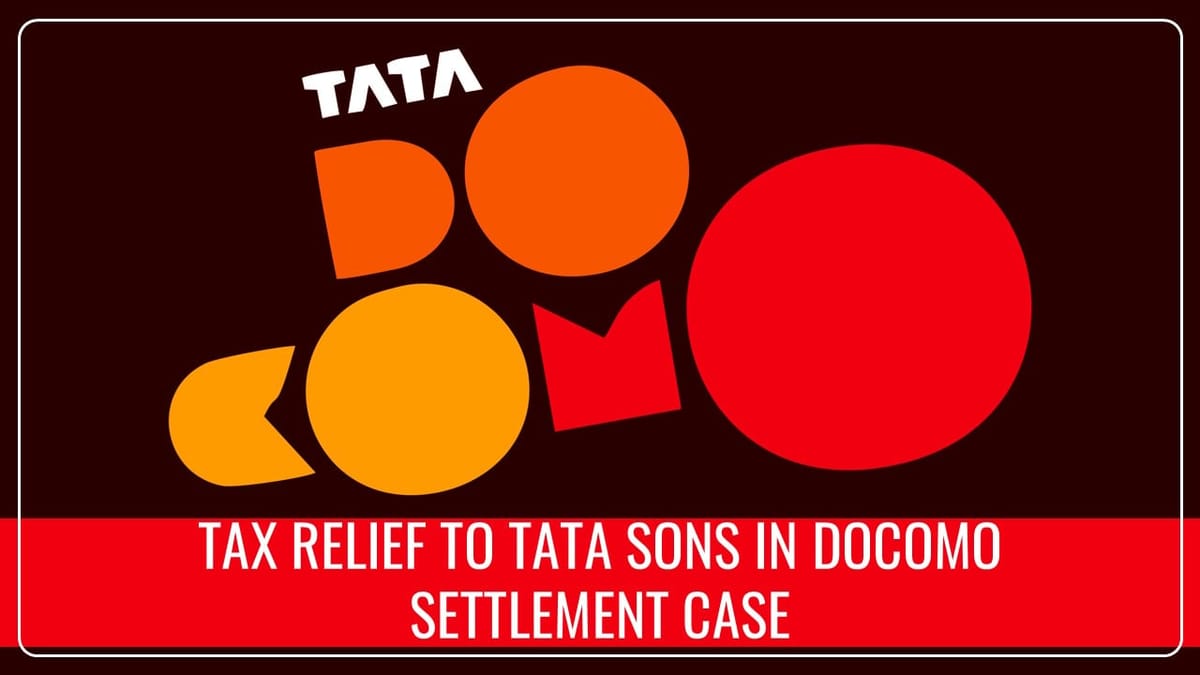Reetu | Sep 23, 2024 |

Tata Sons gets Tax Relief from huge Rs.1,500 Crore GST Demand in Docomo Settlement Case
The Adjudicating Authority (AA) of the Goods and Services Tax (GST) department has dismissed a GST demand of over Rs.1,500 crore against Tata Sons in connection with a settlement agreement with Docomo, providing major tax relief to the company.
The AA order will serve as a precedent for companies involved in arbitration, according to officials familiar with the situation.
“The department has the option of contesting it before the High Court,” one official stated.
In 2019, the Directorate General of GST Intelligence (DGGI) claimed 18% GST on the $1.27 billion paid by the Tata Group holding company to the Japanese telecommunications operator in 2017 to resolve a dispute with Tata Teleservices.
It argued that because the payment was made on behalf of Tata Teleservices, it should be considered a loan from Tata Sons to the group entity and so subject to 18% GST.
Tata Sons opposed the allegation, claiming that the payment was the result of arbitration procedures in a London court, and hence GST did not apply.
Subsequently, in November 2022, the salt-to-software conglomerate filed a writ petition with the Bombay High Court, citing a circular issued by the Central Board of Indirect Taxes and Customs (CBIC) on August 3, 2022, and another issued on February 28, 2023, claiming that no GST could be levied on liquidated damages.
“The amount was paid on behalf of Tata Teleservices by Tata Sons, not for any services provided by Docomo. It is an arbitration case that has been paid and resolved… DGGI is looking at it in a very technical manner,” the company said before the High Court.
However, in 2023, the HC permitted the department to issue the company a show-cause notice (SCN), which the company later contested before the AA.
“The AA relied on the company’s arguments while ruling in its favour,” the official quoted above stated. Since this is the order of the AA, it would act as an example for other companies facing similar litigations,” the person stated.
Tata Sons did not respond to the AA order.
The DGGI imposed the GST in accordance with Schedule 2 of the CGST Act, which classifies loan payments as services rendered.
“Since Tata Sons is the holding company, it is liable to pay 18% GST on behalf of Tata Teleservices,” according to a senior official.
Advait M Sethna, an attorney who specialises in indirect tax and arbitration, stated that the Telangana Advance Ruling Authority recently ruled that GST is not due on out-of-court settlements.
“In my opinion, liquidated damages arising in arbitration are usually exempt from GST,” said the commissioner.
“However, it appears that if the award is due to claims deriving from goods and/or services as described in the GST Act, GST will be leviable to that degree. The provision under the GST Act clearly excludes money security and actionable claims,” Sethna stated.
NTT Docomo purchased a 26.5% stake in Tata Teleservices in 2009. The two parties had agreed at the time that the Japanese company may exit the collaboration for a predetermined minimum price–at least half of what it paid to acquire the interest. Due to Tata Teleservices’ financial troubles, the Japanese company attempted to execute that option in 2015.
The Reserve Bank of India (RBI) however believed that such a change could only take place at fair market value, in accordance with a rule revised in 2013. Tata Sons, then managed by the late Cyrus Mistry, asserted this and declined to pay the agreed-upon amount. Docomo moved for international arbitration and said in 2017 that it had earned $1.27 billion from Tata Sons for its stake in Tata Teleservices Ltd (TTSL).
In case of any Doubt regarding Membership you can mail us at [email protected]
Join Studycafe's WhatsApp Group or Telegram Channel for Latest Updates on Government Job, Sarkari Naukri, Private Jobs, Income Tax, GST, Companies Act, Judgements and CA, CS, ICWA, and MUCH MORE!"